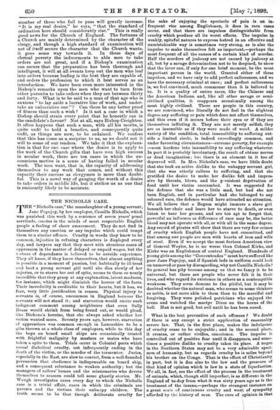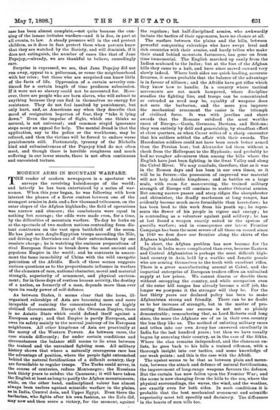THE NICHOLLS CASE. T HE "Nicholls case," the manslaughter of a
young servant, Jane Popejoy, by her employer, Camilla Nicholls, which was punished this week by a sentence of seven years' penal servitude, creates in the minds of most respectable English people a feeling of sheer amazement. They do not find in themselves any emotion or any impulse which could tempt them to a similar offence. Cruelty in words they know to be common, injustice in refusing characters is displayed every day, and lawyers say that they meet with atrocious cases of oppression in the matter of delayed or unpaid wages, but the torture of dependants is believed to be outside experience. They all know, if they know themselves, that almost anything is possible in a moment of passion, but habitually to ill-treat and beat a young servant girl until she dies slowly of her injuries, or to starve her out of spite, seems to them so nearly incredible that they grasp at any explanation, latent madness, for instance, which might diminish the horror of the facts. Their incredulity is creditable to their hearts, but it has, we fear, very little justification in reason. Physical injury to servants is, of course, uncommon in England because the servants will not stand it ; and starvation would excite such indignant comment among neighbours that even Sally Brass would shrink from being found out, or would plead, like Dickens's heroine, that she always asked whether her victim wanted more. Seventy years ago, however, starvation of apprentices was common enough in Lancashire to be a gibe thrown at a whole class of employers, while to this day the boys on board small ships are occasionally treated with frightful malignity by masters or mates who have taken a spite to them. Trials occur in Colonial ports which reveal diabolical cruelty, not infrequently ending in the death of the victim, or the murder of the tormentor. Jnries, especially in the East, are slow to convict, from a well-founded persuasion that obedience is indispensable on board ship, and a consequent reluctance to weaken authority ; but the managers of sailors' homes and the missionaries who devote themselves to seamen could tell some ghastly stories. Mr. Waugh investigates cases every day to which the Nicholls case is a trivial affair, cases in which the criminals are parents and the victims their unhappy children. The truth seems to be that though deliberate cruelty for the sake of enjoying the spectacle of pain is an in- frequent vice among Englishmen, it does in rare cases occur, and that there are impulses distinguishable from cruelty which produce all its worst effects. The impulse in weakly, spiteful natures to express hatred in an effective and unmistakeable way is sometimes very strong, as is also the impulse to make themselves felt as important, —perhaps the most frequent of all the causes of a certain kind of murder. Half the murders of jealousy are not caused by jealousy at all, but by a savage determination not to be despised, to show that the lover can, if only for one brief moment, be the most important person in the world. Granted either of these impulses, and we have only to add perfect callousness, and we have the necessary criminal at once ; and perfect callousness is, we feel convinced, much commoner than it is believed to be. It is a quality of entire races, like the Chinese and the American Indians, and, like all other savage or semi- civilised qualities, it reappears occasionally among the most highly civilised. There are people in this country, we are convinced, who literally do not feel in the slightest degree any suffering or pain which does not affect themselves, and this even if it occurs before their eyes or if they are themselves inflicting it. They are not merely selfish, they are as insensible as if they were made of wood. A milder variety of the condition, total insensibility to suffering out- side a limited circle, is indeed exceedingly common, and under favouring circumstances—extreme poverty, for example —soon hardens into insensibility to any suffering whatever. In part it is probably involuntary, the result of obtuse nerves or dead imagination ; bat there is an element in it too of depraved will. In Mrs. Nicholls's ease, we have little doubt that she took an active dislike to the unhappy servant girl, that she was utterly callous to suffering, and that she gratified the desire to make her dislike felt and impres- sive by threats, blows, and the p .rsistent deprivation of food until her victim succumbed. It was suggested for the defence that she was a little mad, but had she not been English, and in particular had she belonged to any coloured race, the defence would have attracted no attention. We all believe that a Begum might immure a slave girl beneath her chair and leave her to starve to death, or even listen to hear her groans, and are too apt to forget that, powerful an influence as difference of race may be, the better blood may not operate with all, or with all in the same degree. Any record of pirates will show that there are very few crimes of cruelty which English people have not committed, and that among our people are men with hearts of iron and wills of steel. Even if we accept the most furious American view of General Weyler, he is no worse than Colonel Kirke, and Kirke was an Englishman of central England. Hundreds of young girls among the "Concentrados " must have suffered like poor Jane Popejoy, and if Spanish lads in uniform could look on unmoved or pass by disregarding, why not Camilla Nicholls? So general has pity become among us that we fancy it to be universal, but there are people who never felt it in their lives, and who regard its existence in others as a contemptible weakness. They seem demons to the pitiful, but it may be doubted whether the natural man, who seems to some thinkers so noble, is not more akin to them than to the merciful and forgiving. They were polished patricians who enjoyed the arena and watched the martyr Dirce on the horns of the bull. Man is not good, bat evil until he has been cured.
What is the best preventive of such offences P We doubt if there is any except a strict application of reasonably severe law. That, in the first place, makes the indulgence of cruelty cease to be enjoyable; and in the second place, it creates, or rather vivifies, conscience. The impulse is controlled out of positive fear until it disappears, and some- times a positive dislike to cruelty takes its place. A negro in the Southern States may not be a very admirable speci- men of humanity, but as regards cruelty he is miles beyond his brother on the Congo. That is the effect of Christianity in part, but it is due also to the law and the pressure of that kind of opinion which is law in a state of liquefaction. We all, in fact, see the effect of the process in the treatment of animals, which, though still imperfect, is as different in the England of to-day from what it was sixty years ago as is the treatment of the insane,—perhaps the strangest instance on a great scale of continuous cruelty and want of sympathy afforded by the history of man. The cure of opinion in that
case has been almost complete,—not quite because the cun- ning of the insane irritates warders—and it is due, in part at all events, to law. A steady pressure will in the end protect children, as it does in fact protect them when parents know that they are watched by the Society, and will diminish, if it does not extinguish, the number of cases like that of Jane Popejoy,—already, we are thankful to believe, exceedingly rare.
Surprise is expressed, we see, that Jane Popejoy did not run away, appeal to a policeman, or rouse the neighbourhood with her cries ; but those who are surprised can know little of the facts of life. Oppression of a certain severity con- tinued for a certain length of time produces submission. If it were not so slavery could not be accounted for. More- over, there are people who are born slaves, who will submit to anything because they can find in themselves no energy for resistance. They do not feel insulted by punishment, but only hurt, and, as Americans say when they describe that mood of resignation begotten of fear, they "take it lying down." Even the impulse of flight, which one thinks so natural, is not universal ; and common stupid ignorance stops many an appeal for help. The mental dread is that the application, say to the police or the workhouse, may be refused, and then the victims will be forced to endure worse punishments still. Fortunately, tyranny of the Nicholls kind and submissiveness of the Popejoy kind do not often meet, and though there is horrible roughness and much suffering in our lower streets, there is not often continuous and unresisted torture.







































 Previous page
Previous page